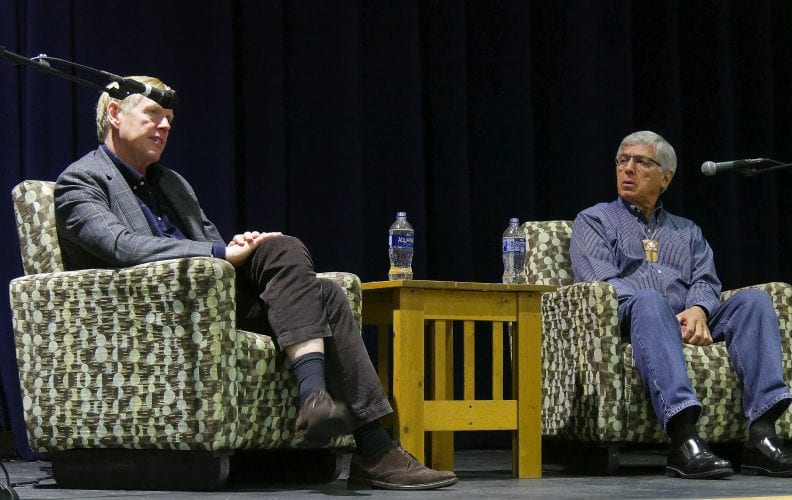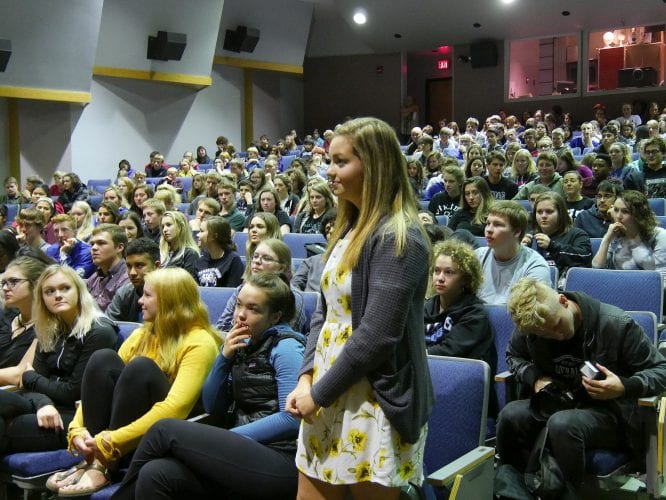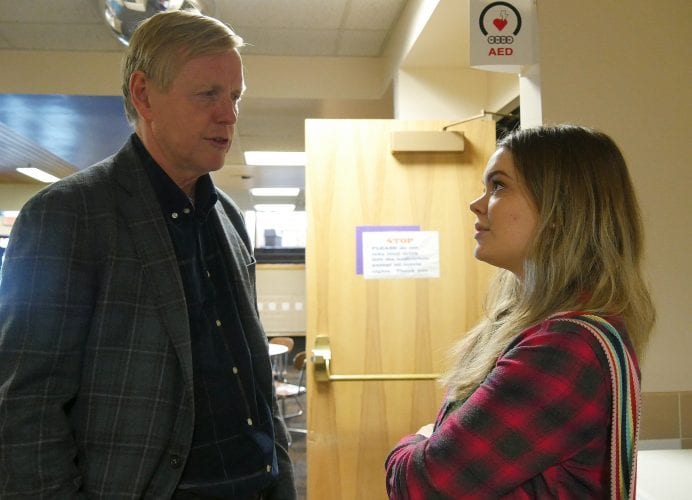
Kåre Aas, Norway Ambassador to the United States (left) and Lt. Governor Byron Mallott address middle and high school students in Petersburg, Sept. 29. (Photo by Angela Denning/KFSK)
Junior High and High School students filled the auditorium while Ambassador Kåre Aas and Lt Governor Byron Mallott took the stage.
Ambassador Aas told the crowd what happens in the Arctic has a global effect.
“So the big debate in Norway is really, ‘how can you continue to produce oil and gas while at the same time maintaining or reaching the sort of goals on climate?’” Aas said.
Even though Norway is an oil and gas producer, nearly all of the country’s electricity is produced by hydro power. Over a quarter of Norway’s cars are electric because the government gives consumers tax breaks on them. Electric car drivers can also use the transport lanes along with buses.
“I think even before 2030 all cars in Norway will be electric,” Aas said.
Aas says Norway is using new technology in unmanned, battery powered marine vessels. And they’re testing it on airplanes. The students laughed at the thought of unmanned airplanes but Aas says it’s the future.
“I’m sure [because] you are so young, I’m convinced that one day you will go flying in a battery driven aircraft and you have so many small airplanes in Alaska,” Aas said.
Aas talked about the importance of the Paris Agreement in which most United Nations agree to address climate change. The U.S. used to be part of it but President Trump withdrew from it. Aas says Norway will work closely with states like California, which say they will work on the agreement despite the administration.

Petersburg High School student, Alice Neidiffer, asks a question to Ambassador Kåre Aas and Lt. Governor Byron Mallott in the Wright Auditorium, Sept. 29. (Photo by Angela Denning/KFSK)
Aas says as Northerners on the planet the students are seeing climate change quickly and he encouraged them to use social media to educate others. Lt. Governor Byron Mallot put it this way.
“I would submit to you, you own it. Your generation owns climate change,” Mallott said. “Because you will live with and be responsible for making policy and dealing with technology for example, that probably our generation can’t even imagine.”
Mallott is the Governor’s climate change advisor. He says Alaska needs to identify and reduce emissions, which won’t be easy in a state that’s so reliant on petroleum. But he says specifically, the state needs to work with businesses where there are no local standards for emissions.
“Transportation emissions reduction is hugely important,” Mallott said. “In much of rural Alaska, carbon fuels, diesel, in particular, is still the principle source of electrical energy and even home heating and creating pathways and support and technology to over time in a planned way reduce those emissions, that dependence.”
Mallott says change is already happening. Communities are being relocated because of erosion, which is very expensive. He says there needs to be better science and more research.
“The state of Alaska recognizes that it needs to step up its own involvement and sense of obligation reality to its own people as we deal with a changing climate if our federal government is not going to be as focused as we believe it should be,” Mallott said.
Mallott also brought up Alaska’s forests as a possible business venture.
“If we are able to withdraw carbon from the atmosphere and store it, for example, in forest, that is a good thing,” he said.
He says some Alaska Native Corporations are already in discussions with carbon emitting businesses to get paid for not changing the character of their forests.
“It’s not the long term answer, we must reduce emissions overall, but it’s one thing that Alaska’s businesses are already involved with,” Mallott said.

Kåre Aas, Norway Ambassador to the United States speaks with Petersburg High School student, Marissa Nilsen after addressing the student body in the Wright Auditorium, Sept. 29. (Photo by Angela Denning/KFSK)
In Norway, Aas says consumers are driving change within the private business sector. He says there is a national consensus on continuing economic growth and addressing climate change. He says Norway also partners with developing countries to protect their rain forests.











